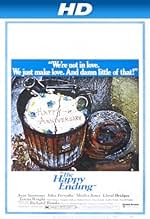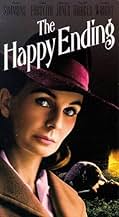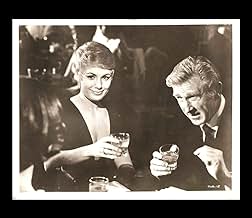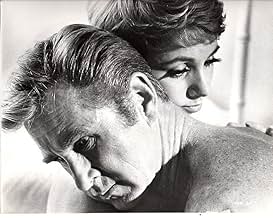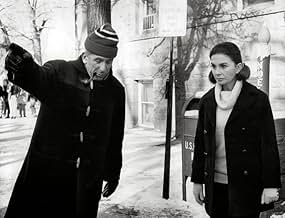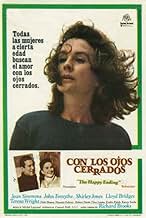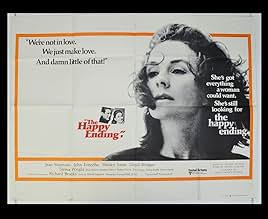AVALIAÇÃO DA IMDb
6,3/10
1,4 mil
SUA AVALIAÇÃO
Adicionar um enredo no seu idiomaA middle-aged woman walks out on her husband and family in an desperate attempt to find herself.A middle-aged woman walks out on her husband and family in an desperate attempt to find herself.A middle-aged woman walks out on her husband and family in an desperate attempt to find herself.
- Indicado a 2 Oscars
- 5 indicações no total
Bobby Darin
- Franco
- (as Robert Darin)
William O'Connell
- Minister
- (as Wm. O'Connell)
Ingrid Bergman
- Self - Actress in 'Casablanca'
- (cenas de arquivo)
- (não creditado)
Humphrey Bogart
- Self - actor in 'Casablanca'
- (cenas de arquivo)
- (não creditado)
Avaliações em destaque
Pauline Kael, film critic for the New Yorker, quipped about this film, "It's the kind of liberation movie that never liberated anyone." That's a clever line, but it isn't exactly true. Writer-director Richard Brooks shows the upwardly mobile as stiff dullards with drinks in their hands, the upper middle class as stifling bores. There's wry wit in these vignettes, but the trouble with Brooks' film is the central character. As played by Jean Simmons, she's one of those bored and lonely housewives who desires MORE! Simmons is repressed of her emotions, yet even when she makes her escape, she's still a pinchy drag. The supporting characters aren't written any better, but the performers themselves are more interesting: Bobby Darin is terrific as a phony gigolo, Tina Louise excellent as an acerbic society wife, Shirley Jones lovely as a single woman trying to remain casual about her married lover. John Forsythe gives his standard controlled performance as Simmons' confused spouse (he doesn't know how to reach her, which is a sympathetic quality since we don't either). The title means to tell us that we make our own happy endings--that we can't find them through other people--and the final scene between husband and wife is a tricky little chess-move that leaves us up in the air. I liked many things in "The Happy Ending", but its parts are better than the sum. **1/2 from ****
Well, The Happy Ending is a textbook example of a late sixties movie by an established director. In as much as it is well intended, partly even "hip" but still missed its audience by a mile. How is that? The late sixties were a bad time for Hollywood filmmakers and producers. The box office numbers dropped and the pressure to have a hit increased. The well-known directors of the thirties, forties and fifties more and more lost contact with the moviegoers. One can almost say that Hollywood made films for a past generation. Looking at the big winners and losers tells you that a new style was in demand. This of course happened world wide.
It is interesting to notice that many of the best directors still had a hit in the early sixties but finished with a big flop in the end of the same decade! The bigger the director, the greater the downfall, I'm tempted to say.
And the failure was not only that not enough people went to see the films. In most cases the public was right and the film was just not good. The producers put pressure on the filmmakers to employ more modern stories and story telling devices and fresh faces. The established directors were not used to this cold wind blowing into their faces, and had little ideas what the public wanted to have changed. Everyone tried something but no one really hit the nail on the head. Let's have a look at some of them. Hitchcock started the sixties with Psycho and ended with Topaz. Billy Wilder started with The Apartment and ended the decade with The Private Life of Sherlock Holmes. Otto Preminger had a big hit with Exodus in 1960 but his last film in the sixties, Skidoo, did so badly with critics and public that few people ever saw it. Frank Capra realized the changes and stopped film-making in 1961.
Fred Zinnemann began the sixties with The Sundowners, had a big Success with A Man of all Seasons, but couldn't get the funding for another project until The Day of the Jackal (1973) since box office in general was going down and producers were scared. Most of the named directors managed to get a foot on the ground again in the seventies and end their career with a respectable picture.
Some managed to have hits till to the middle of the sixties like Robert Wise with Sound of Music, but even that did not help to prevent him from having a bomb with Star!. Richard Brooks had a similar experience with In Cold Blood, that was followed by The Happy Ending. What was going on?
I think the fact that the general interest of the audience changed dramatically throughout the sixties almost completely eluded the Hollywood producers and filmmakers. And when they finally notices and tried to join the new wave it turned out that they have been too old to understand what was going on or that they thought it is enough to get some new faces into their films to appeal to a young and critical audience. Howard Hawks for example tried to jump on the wagon by simply recycling one of his earliest successes The Crowd Roars with new and unknown (and in-experienced) actors but did basically the same thing in Red Line 7000. It was a terrible mistake.
The dinosaur directors only managed to make money by concentrating again on what they did best and Hawks did El Dorado and had a decent swan song with Rio Lobo. Hitchcock tried to join in on the big business with spy movies that made so much money in the form of James Bond or his little brother Harry Palmer. Hitch tried it with Torn Curtain and with Topaz. To be on the safe side he even took a bestseller from Leon Uris (Topaz). The stories as they were told were mainly old fashioned. He had same new ideas in them but the general approach was like the espionage films he did in the thirties. He got out of this loop by going back to the kind of thrillers he was famous for and returned to the screen with Frenzy and had a good final movie with The Family Plot.
The studio system that already started to die with the advent of TV collapsed for good. New directors like Bogdanovich, Scorsese, Coppola and so on began to work for the big studios only after they started for small budget producers, mainly Roger Corman. Others like Dennis Hopper or John Cassavetes had long worked as an actor before being able to direct.
But what exactly is wrong with The Happy Ending? The story line is about a couple after they married. It tries to have a realistic look about problems arising from delusions almost everyone has about "happy ends". Jean Simmons still looks very young and attractive and John Forsythe does his very best. For one thing the constant music playing that lies like a veil over every scene that is really annoying. I'm a big fan of Michel Legrand but this film suffers from the soundtrack he wrote. (Two for the Road is another film that is, theme and music, very similar to The Happy Ending. This time Henry Mancini's music drowns every serious feeling.)
The story drags on and on, we see many episodes that amount to very little. The dialog is dull and everyone moves in upper class levels. The worst thing about The Happy Ending is that everything and everyone seems so boring. At the end you do not care what Jean Simmons decides. You are only glad the movie is over.
It is interesting to notice that many of the best directors still had a hit in the early sixties but finished with a big flop in the end of the same decade! The bigger the director, the greater the downfall, I'm tempted to say.
And the failure was not only that not enough people went to see the films. In most cases the public was right and the film was just not good. The producers put pressure on the filmmakers to employ more modern stories and story telling devices and fresh faces. The established directors were not used to this cold wind blowing into their faces, and had little ideas what the public wanted to have changed. Everyone tried something but no one really hit the nail on the head. Let's have a look at some of them. Hitchcock started the sixties with Psycho and ended with Topaz. Billy Wilder started with The Apartment and ended the decade with The Private Life of Sherlock Holmes. Otto Preminger had a big hit with Exodus in 1960 but his last film in the sixties, Skidoo, did so badly with critics and public that few people ever saw it. Frank Capra realized the changes and stopped film-making in 1961.
Fred Zinnemann began the sixties with The Sundowners, had a big Success with A Man of all Seasons, but couldn't get the funding for another project until The Day of the Jackal (1973) since box office in general was going down and producers were scared. Most of the named directors managed to get a foot on the ground again in the seventies and end their career with a respectable picture.
Some managed to have hits till to the middle of the sixties like Robert Wise with Sound of Music, but even that did not help to prevent him from having a bomb with Star!. Richard Brooks had a similar experience with In Cold Blood, that was followed by The Happy Ending. What was going on?
I think the fact that the general interest of the audience changed dramatically throughout the sixties almost completely eluded the Hollywood producers and filmmakers. And when they finally notices and tried to join the new wave it turned out that they have been too old to understand what was going on or that they thought it is enough to get some new faces into their films to appeal to a young and critical audience. Howard Hawks for example tried to jump on the wagon by simply recycling one of his earliest successes The Crowd Roars with new and unknown (and in-experienced) actors but did basically the same thing in Red Line 7000. It was a terrible mistake.
The dinosaur directors only managed to make money by concentrating again on what they did best and Hawks did El Dorado and had a decent swan song with Rio Lobo. Hitchcock tried to join in on the big business with spy movies that made so much money in the form of James Bond or his little brother Harry Palmer. Hitch tried it with Torn Curtain and with Topaz. To be on the safe side he even took a bestseller from Leon Uris (Topaz). The stories as they were told were mainly old fashioned. He had same new ideas in them but the general approach was like the espionage films he did in the thirties. He got out of this loop by going back to the kind of thrillers he was famous for and returned to the screen with Frenzy and had a good final movie with The Family Plot.
The studio system that already started to die with the advent of TV collapsed for good. New directors like Bogdanovich, Scorsese, Coppola and so on began to work for the big studios only after they started for small budget producers, mainly Roger Corman. Others like Dennis Hopper or John Cassavetes had long worked as an actor before being able to direct.
But what exactly is wrong with The Happy Ending? The story line is about a couple after they married. It tries to have a realistic look about problems arising from delusions almost everyone has about "happy ends". Jean Simmons still looks very young and attractive and John Forsythe does his very best. For one thing the constant music playing that lies like a veil over every scene that is really annoying. I'm a big fan of Michel Legrand but this film suffers from the soundtrack he wrote. (Two for the Road is another film that is, theme and music, very similar to The Happy Ending. This time Henry Mancini's music drowns every serious feeling.)
The story drags on and on, we see many episodes that amount to very little. The dialog is dull and everyone moves in upper class levels. The worst thing about The Happy Ending is that everything and everyone seems so boring. At the end you do not care what Jean Simmons decides. You are only glad the movie is over.
Jean Simmons makes this compelling viewing. The back-story of the film is that director Richard Brooks, Simmons husband at the time, was concerned and aware of Jean's alcoholism and designed the picture not only as a showcase for her prestigious talent, rewarded with an Oscar nomination, but hopefully a wakeup call for her. It didn't work immediately and eventually helped destroy their marriage but she was able to eventually conquer her demons and live sober until the end of her life. The film itself is a scatter-shot affair what with its frequent flashbacks and fragmented nature but does have a beautiful score and excepting Bobby Darin very good supporting work. Shirley Jones is notable in particular in the smallish role of an old college chum of Jean's. The ending is beautifully done, simple and true.
--this film is for you, as you'll hear that song constantly throughout the film.
"The Happy Ending" stars Jean Simmons, John Forsythe, Teresa Wright, Shirley Jones, Nanetete Fabray and Lloyd Bridges, and is directed by Simmons' husband, Richard Brooks. Interestingly, Teresa Wright didn't like his directing and found it pedantic, adding, "but I can't say anything because of Jean."
Jean Simmons is one of my favorite actresses and this story serves her well. After twenty years, the lust is gone from Mary Wilson's marriage to husband Fred (Forsythe); she drinks, she pops pills, and finally, after a huge spending spree, her husband takes her credit cards and charge accounts away from her.
Her favorite thing is watching old movies which have happy endings; strangely, one of her favorites is Casablanca. Casablanca has a noble ending, even a satisfactory ending. But a happy ending? I mean, Bogie ends up with Louis.
Finally, Mary manages to get her hands on some money, and she takes off for the Bahamas, where she is taken in by an old school friend (Shirley Jones), the "other woman" in several relationships who now finds herself involved with Lloyd Bridges, looking pretty darn good, I might add.
The film seems to be a series of flashbacks and music videos; it is surprising how little dialogue there actually is. Jean Simmons at 40 is radiantly beautiful as usual and she does a great job as Mary.
Simmons was a totally underrated actress, squeezed in as she was with the likes of Audrey Hepburn and Elizabeth Taylor. Brooks again has cast Shirley Jones as a bad girl, and again, she's effective. Teresa Wright plays Mary's mother, who can't quite understand her daughter's quest for happiness. Mary wants the fairytale.
I found this film just okay, at times confusing because of the seamlessness of the flashbacks, and frankly, I got sick of hearing "What are you doing...", a song a young man once sang to me and informed me that he had written it. Right.
Anything with Simmons is worth seeing, but at times, this one is tough going.
"The Happy Ending" stars Jean Simmons, John Forsythe, Teresa Wright, Shirley Jones, Nanetete Fabray and Lloyd Bridges, and is directed by Simmons' husband, Richard Brooks. Interestingly, Teresa Wright didn't like his directing and found it pedantic, adding, "but I can't say anything because of Jean."
Jean Simmons is one of my favorite actresses and this story serves her well. After twenty years, the lust is gone from Mary Wilson's marriage to husband Fred (Forsythe); she drinks, she pops pills, and finally, after a huge spending spree, her husband takes her credit cards and charge accounts away from her.
Her favorite thing is watching old movies which have happy endings; strangely, one of her favorites is Casablanca. Casablanca has a noble ending, even a satisfactory ending. But a happy ending? I mean, Bogie ends up with Louis.
Finally, Mary manages to get her hands on some money, and she takes off for the Bahamas, where she is taken in by an old school friend (Shirley Jones), the "other woman" in several relationships who now finds herself involved with Lloyd Bridges, looking pretty darn good, I might add.
The film seems to be a series of flashbacks and music videos; it is surprising how little dialogue there actually is. Jean Simmons at 40 is radiantly beautiful as usual and she does a great job as Mary.
Simmons was a totally underrated actress, squeezed in as she was with the likes of Audrey Hepburn and Elizabeth Taylor. Brooks again has cast Shirley Jones as a bad girl, and again, she's effective. Teresa Wright plays Mary's mother, who can't quite understand her daughter's quest for happiness. Mary wants the fairytale.
I found this film just okay, at times confusing because of the seamlessness of the flashbacks, and frankly, I got sick of hearing "What are you doing...", a song a young man once sang to me and informed me that he had written it. Right.
Anything with Simmons is worth seeing, but at times, this one is tough going.
I love movies that come down hard against conventional life. And the ones that feature nagging, chronically unhappy, never-satisfied married people go in my "horror" stack, along with Halloween, Videodrome, Suspiria, The Fog, etc. Watching that way of life is enough to fill anyone with ineffable dread.
When you consider that lead actress Jean Simmons and director Richard Brooks (married 1960-1977) were on their way to divorce, that just adds to the terror.
Though it echoes themes in Charlotte Perkins Gilman's The Yellow Wallpaper (1899), The Happy Ending is still seen as a proto-feminist text, which it well may be. I've long held that Jean Simmons (or at least the "Jean Simmons image") is not this quiet, polite, understated "demure beauty" that is somehow constantly breaking out of that particular mold. Ms. Simmons herself can be seen as a "proto-feminist" or strong female lead actress. She demonstrates this in Hamlet, Desiree, Young Bess, The Big Country, and certainly Elmer Gantry; one could actually make this case for many of her films available on video.
Her part in The Happy Ending is really just an expansion of these roles, only this time, the unhappy marriage is brought to the fore instead of subsumed in Hollywood/Happy ending resolve.
It's not just proto-feminist women who feel trapped by marriage; that men get cold feet and then have affairs is almost too cliché to mention or bother to put in quotes. How many movies about extramarital affairs have entertained millions? This film just happens to present the unthinkable horror of when a woman wants out of it. Good for them. 8/10, but be advised, this is coming from someone unable to resist movies about women who don't want to be married.
To this end, see it as a double feature with Baby Doll (1956), or Possession (1981), mess up your mind, a little.
When you consider that lead actress Jean Simmons and director Richard Brooks (married 1960-1977) were on their way to divorce, that just adds to the terror.
Though it echoes themes in Charlotte Perkins Gilman's The Yellow Wallpaper (1899), The Happy Ending is still seen as a proto-feminist text, which it well may be. I've long held that Jean Simmons (or at least the "Jean Simmons image") is not this quiet, polite, understated "demure beauty" that is somehow constantly breaking out of that particular mold. Ms. Simmons herself can be seen as a "proto-feminist" or strong female lead actress. She demonstrates this in Hamlet, Desiree, Young Bess, The Big Country, and certainly Elmer Gantry; one could actually make this case for many of her films available on video.
Her part in The Happy Ending is really just an expansion of these roles, only this time, the unhappy marriage is brought to the fore instead of subsumed in Hollywood/Happy ending resolve.
It's not just proto-feminist women who feel trapped by marriage; that men get cold feet and then have affairs is almost too cliché to mention or bother to put in quotes. How many movies about extramarital affairs have entertained millions? This film just happens to present the unthinkable horror of when a woman wants out of it. Good for them. 8/10, but be advised, this is coming from someone unable to resist movies about women who don't want to be married.
To this end, see it as a double feature with Baby Doll (1956), or Possession (1981), mess up your mind, a little.
Você sabia?
- CuriosidadesJean Simmons has said that the film was a very painful one for her, as she herself was having problems with alcohol at the time. According to Simmons, her then-husband Richard Brooks wrote the film especially for and about her: he hoped that playing Mary might help her to more clearly see her own problems.
- Erros de gravaçãoDuring the opening-credit sequence, many late-model 1960's cars are seen in flashback scenes supposedly set 15 years earlier.
- Citações
[last lines]
Mary Wilson: If... if right now we were not married, if you were free, would you marry me again ?
- Versões alternativasThe film was originally submitted to the MPAA for an R rating. After United Artists found Richard Brooks' intended cut too depressing, the studio forced to cut the film into a "moviegoer friendly" cut that was rated M. Brooks' R-rated cut was released in other countries as intended but was not released in the United States until 2016.
- ConexõesFeatures Susan Lenox (1931)
- Trilhas sonorasWhat Are You Doing the Rest of Your Life?
Music by Michel Legrand
Lyrics by Alan Bergman and Marilyn Bergman
Sung by Michael Dees
Principais escolhas
Faça login para avaliar e ver a lista de recomendações personalizadas
- How long is The Happy Ending?Fornecido pela Alexa
Detalhes
- Tempo de duração
- 1 h 57 min(117 min)
- Proporção
- 2.35 : 1
Contribua para esta página
Sugerir uma alteração ou adicionar conteúdo ausente


